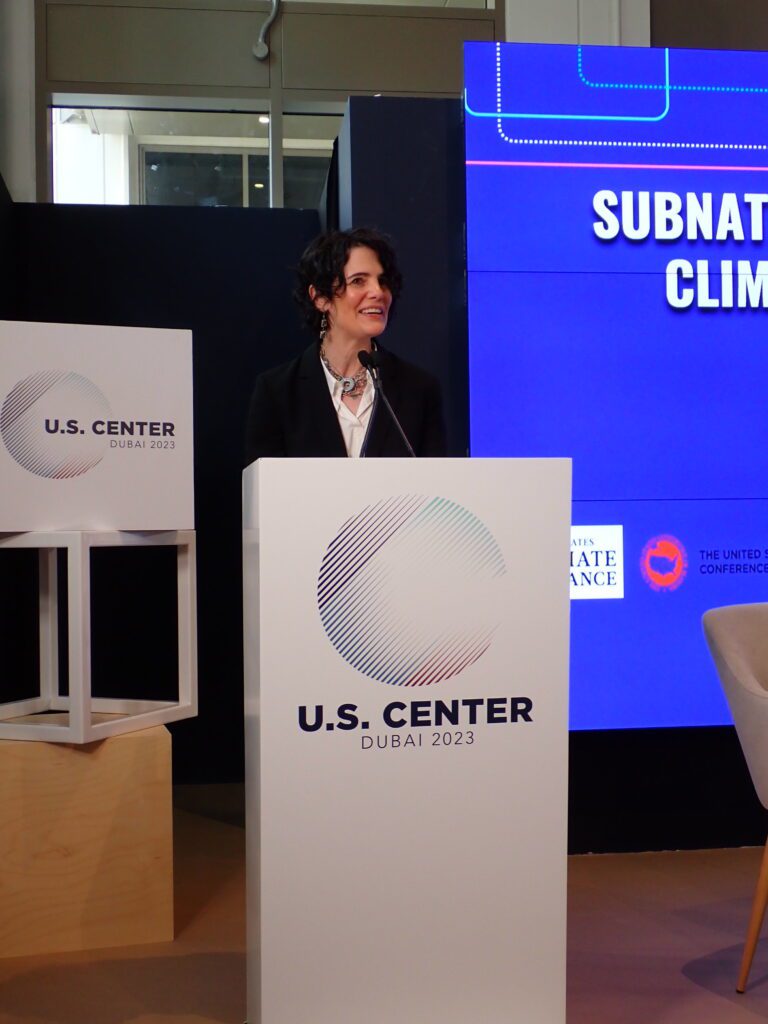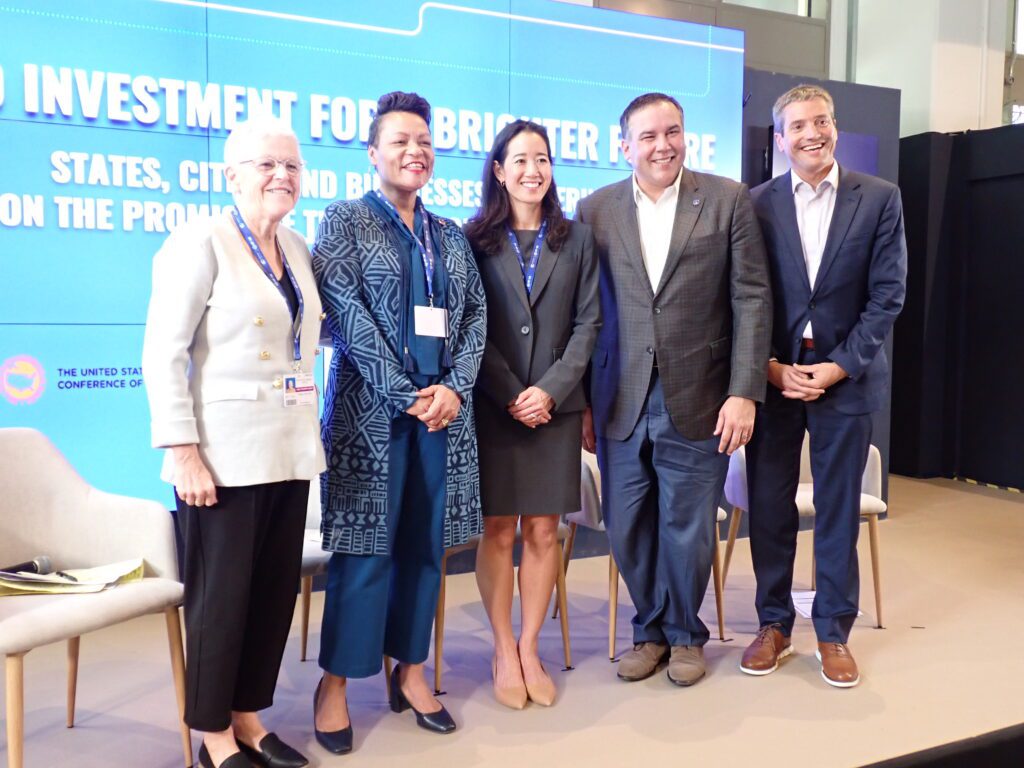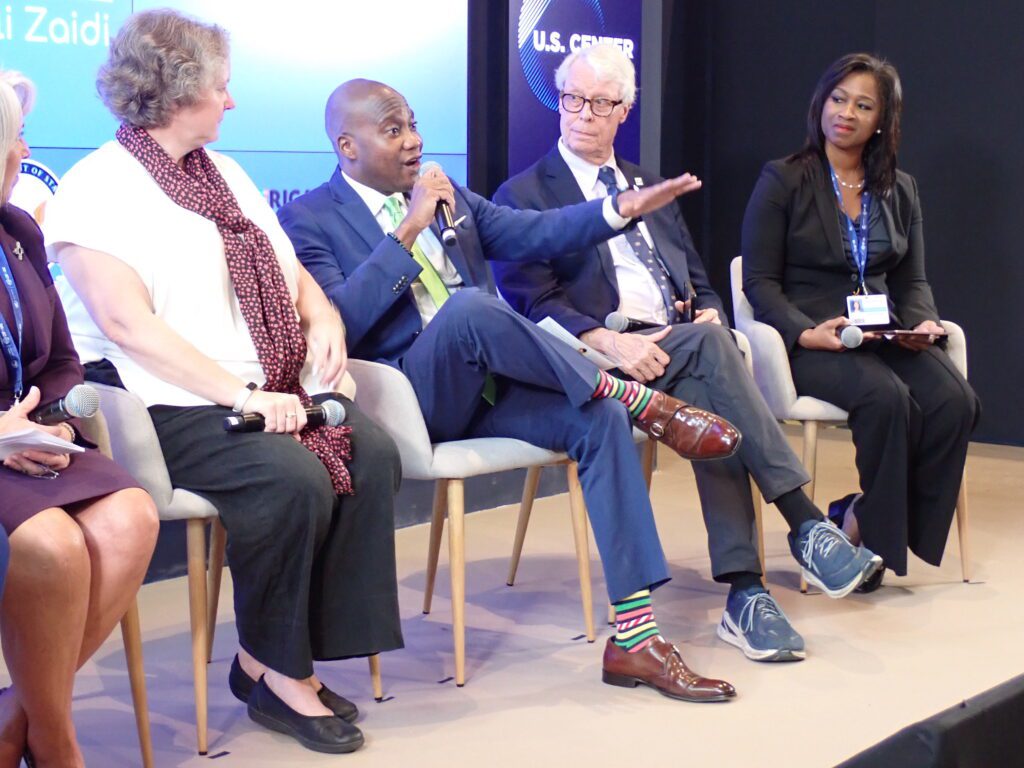The Inflation Reduction Act (IRA) marks a historic leap in the United States’ response to the climate crisis, echoing the sentiment that “the climate crisis demands an all-of-society and all-of-government approach,” as emphasized by Ambassador Nina Hachigian, U.S. Special Representative for City and State Diplomacy.

The IRA aims to propel the U.S. towards an 80% clean power sector and transition to electric vehicles, targeting half of all new vehicle sales to be electric by 2030. Notably, the IRA serves as a catalyst for private sector-led clean energy initiatives, sparking a significant clean energy boom. This has resulted in the creation of over 210,000 jobs and attracted more than $266 billion in clean energy manufacturing investments, with a focus on underserved communities, fostering economic growth where it is needed most.
In this climate finance session at COP28, focusing on the impact of the IRA through two pivotal panels, keynote speaker John Podesta, Senior Adviser for Clean Energy Innovations and Implementation, begins by expressing a significant message: “I’m here with one particular important message, which is to say thank you.” This acknowledgment is for local leaders advancing climate action, where decisive steps were taken to decarbonize various sectors, including power, transportation, buildings, industry, agriculture, and forestry.

States, Cities, and Businesses Delivering on the Promise of the Inflation Act
The first panel underscored the significance of a unified approach to the climate crisis, with a focus on the Climate Resilience Initiative. U.S. governors, mayors, and business leaders shared insights on translating this groundbreaking initiative into concrete actions, driving improvements in public health, creating green jobs, cutting costs, boosting the economy, advancing environmental justice, and shaping a collective sustainable future.
The distinguished panel, moderated by Gina McCarthy, Former Administrator of the U.S. Environmental Protection Agency, was:
- Mayor LaToya Cantrell, New Orleans, Louisiana
- Melanie Nakagawa, Chief Sustainability Officer, Microsoft
- Mayor Andrew Ginther, Columbus, Ohio
- Secretary Wade Crowfoot, California Natural Resources
Key Takeaways from Cities:

- The City of New Orleans’s task force, aligned with the IRA, has led to positive outcomes, including funding for urban forestry, recycling initiatives, grid strengthening, wetland restoration, and energy resilience hubs.
- Mayor Cantrel highlighted that residents are first responders and shared, “These [resilience] hubs will be in communities, providing our residents with the resources that they need in real-time, it’s not a matter of if, it’s when disaster comes.”
- Recognized the IRA as a historic legislative milestone, instrumental in implementing the City of Columbus’s first-ever climate action plan and expanding renewable energy investments.
- Public-private partnerships are crucial for involving residents in building a green economy and empowering affected communities for economic growth and prosperity.

Key Takeaways from States:
- California Natural Resources Secretary Wade Crowfoot highlighted the impact of President Biden’s climate targets and the bipartisan Infrastructure Law and Inflation Reduction Act, showcasing America’s commitment to funding and leading on climate action.
- Stressed the global influence of U.S. investment, providing a model for other countries.
- Urged the need to translate political alignment and funding into tangible results aligned with Paris Agreement targets.
Key Takeaways from the Private Sector:

- The private sector has the opportunity to act on climate change, incentives provided by the IRA, and the role of innovation, particularly AI.
- The IRA serves as a policy tool, providing incentives for companies like Microsoft to take ambitious climate actions and fostering new partnerships and initiatives.
- Technology, especially AI, plays a crucial role in aggregating and leveraging data for wildfire resilience and sustainability solutions.
“The Inflation Reduction Act was specifically designed to make sure that
Red and Blue States could both benefit. It was designed to get through the
political rhetoric and talk about people, not just the planet but the human beings
that live here and how to provide them a healthy, safe, and secure future.”
Gina McCarthy, Former Administrator of the U.S. Environmental Protection Agency

Ambitious Innovation and Action by U.S. States, Cities and Regions
The second panel highlighted innovative climate efforts at the subnational level, showcasing how states and cities across the U.S. play a critical role in implementing ambitious climate policies. It emphasized the interplay between ambitious federal action and climate initiatives at all government levels.
The esteemed panel, led by Ali Zaidi, White House National Climate Advisor And Vice Chair of the National Climate Task Force, comprised:
- Governor Michelle Lujan Grisham, New Mexico
- Mayor Satya Rhodes-Conway, Madison, Wisconsin
- Mayor Errick Simmons, Greenville, Mississippi
- Mayor Frank Cownie, Des Moines, Iowa
- Serena McIlwain, Maryland Secretary of the Environment
Key Takeaways from Cities:

- Mayor Cownie shared Des Moines’ initiatives supported by the IRA, including a new greenhouse and animal control facility powered by a solar field. The city focuses on green projects, energy-efficient housing, and urban agriculture to promote sustainability.
- The City of Madison, Wisconsin, is proactively transitioning its fleet to electric vehicles and implementing a bus rapid transit system, leveraging federal support from the IRA. Mayor Satya Rhodes-Conway emphasized the City is doing the work to reduce emissions without getting caught up in micro-measuring.
- Mayor Errick Simmons highlighted the Mississippi River Cities and Towns Initiative’s commitment to nature-based infrastructure, announcing over 100,000 acres for carbon sequestration.
Key Takeaways from States & Regions:
- Governor Michelle Lujan Grisham emphasized the real challenge of transitioning away from coal and addressed it by allocating $40 million to support displaced workers, particularly focusing on Navajo workers, creating a new economy.
- Secretary Serena McIlwain showcased Maryland’s ambitious emission reduction goals, exceeding national and global targets. The state’s comprehensive climate action plan, participation in regional initiatives, and focus on career pathways into the clean energy sector contribute to successful emission reduction strategies, utilizing funds from IRA.

‘We Are All In’
The Inflation Reduction Act (IRA) stands as a testament to the collaborative efforts needed to combat the urgent global challenge of climate change. With inspiring success stories from Iowa’s shift to 87% renewable energy to Maryland’s aggressive emission reduction of 52% by 2030, the call for unity echoes loudly. The rallying cry of ‘we’re all in’ emphasizes the need for public-private collaboration and a shared commitment to building a sustainable future.
Thank you to our valued partners, the United States Climate Alliance, the U.S. Department of State, the United States Conference of Mayors, C40 Cities, Climate Mayors, America Is All In, and the Mississippi River Cities & Towns Initiative, for their pivotal role in developing this session.
*This blog was written based on the COP28 session “COP 28: Subnational Leaders Supercharging Climate Action Across America” in the U.S. Center Pavillion. You can watch the livestream here.